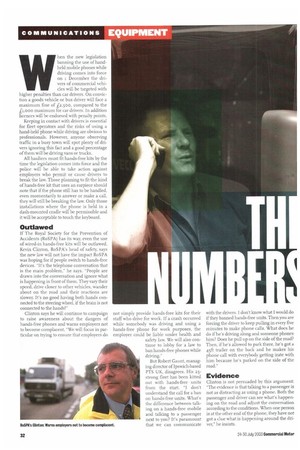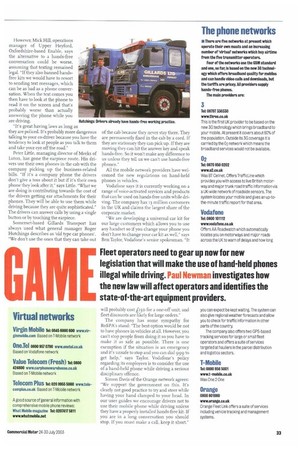VI, hen the new legislation banning the use of handheld
Page 32

Page 33

If you've noticed an error in this article please click here to report it so we can fix it.
mobile phones while driving comes into force on i December the drivers of commercial vehicles will be targeted with higher penalties than car drivers. On conviction a goods vehicle or bus driver will face a maximum fine of f2,5oo, compared to the £1,000 maximum for car drivers. In addition licences will be endorsed with penalty points.
Keeping in contact with drivers is essential for fleet operators and the risks of using a hand-held phone while driving are obvious to professionals. However, anyone observing traffic in a busy town will spot plenty of drivers ignoring this fact and a good percentage of them will be driving vans or trucks.
All hauliers must fit hands-free kits by the time the legislation comes into force and the police will be able to take action against employers who permit or cause drivers to break the law. Those planning to fit the kind of hands-free kit that uses an earpiece should note that if the phone still has to be handled, even momentarily to answer or make a call, they will still be breaking the law. Only those installations where the phone is held in a dash-mounted cradle will be permissible and it will be acceptable to touch the keyboard.
Outlawed
If The Royal Society for the Prevention of Accidents (RoS PA) has its way, even the use of wired-in hands-free kits will be outlawed. Kevin Clinton, RoSPA's head of safety, says the new law will not have the impact RoSPA was hoping for if people switch to hands-free devices. "It's the telephone conversation that is the main problem," he says. "People are drawn into the conversation and ignore what is happening in front of them. They vary their speed, drive closer to other vehicles, wander about on the road and their reactions are slower. It's no good having both hands connected to the steering wheel, if the brain is not connected to the hands!"
Clinton says he will continue to campaign to raise awareness about the dangers of hands-free phones and warns employers not to become complacent. "We will focus in particular on trying to ensure that employers do not simply provide hands-free kits for their staff who drive for work. If a crash occurred while somebody was driving and using a hands-free phone for work purposes, the employer could be liable under health and safety law. We will also continue to lobby for a law to ban hands-free phones while driving."
But Robert Gaunt, managing director of Ipswich-based PTS UK. disagrees. His 25strong fleet has been killed out with hands-free units from the start. "I don't understand the call for a ban on hands-free units. What's the difference between talking on a hands-free mobile and talking to a passenger next to you? It's paramount that we can communicate with the drivers. I don't know what I would do if they banned hands-free units. Then you are forcing the driver to keep pulling in every five minutes to make phone calls. What does he do if he's driving along and someone phones him? Does he pull up on the side of the road? Then, if he's allowed to park there, he's got a 45ft trailer on the back and he makes his phone call with everybody getting irate with him because he's parked on the side of the road."
evidence
Clinton is not persuaded by this argument: "The evidence is that talking to a passenger is not as distracting as using a phone. Both the passenger and driver can see what's happening on the road and adjust the conversation according to the conditions. When one person is at the other end of the phone, they have not got a clue what is happening around the driver," he insists. However, Mick Hill, operations manager of Upper Heyford, Oxfordshire-based Enable, says the alternative to a hands-free conversation could be worse, assuming that texting remained legal. "I If they also banned handsfree kits we would have to resort to sending text messages, which can be as bad as a phone conversation. When the text comes you then have to look at the phone to read it on the screen and that's probably worse than actually answering the phone while you
are driving. Hutchings: Dr Its great having laws as long as
they are policed. It's probably more dangerous talking to your co-driver because you have the tendency to look at people as you talk to them and take your eye off the road."
Peter Little, managing director of Meeks of Luton, has gone the earpiece route. His drivers use their own phones in the cab with the company picking up the business-related bills. "If it's a company phone the drivers don't give a toss about it but if it's their own phone they look after it," says Little. "What we are doing is contributing towards the cost of the drivers getting ear attachments for their phones. They will be able to use them while driving because they are quite sophisticated." The drivers can answer calls by using a single button or by touching the earpiece.
Somerset-based Gillards Transport has always used what general manager Roger Hutchings describes as 'old type car phones'. "We don't use the ones that they can take out of the cab because they never stay there. They are permanently fixed in the cab by a cord. If they are stationary they can pickup. If they are moving they can hit the answer key and speak hands-free. So it won't make any difference to us unless they tell us we can't use hands-free phones."
All the mobile network providers have welcomed the new regulations on hand-held phones in vehicles.
Vodafone says it is currently working on a range of voice-activated services and products that can be used on hands-free units while driving. The company has 13 million customers in the UK and claims the largest share of the corporate market.
We are developing a universal car kit for our large customers which allows you to use any handset so if you change your phone you don't have to change your car kit as well," says Ben Taylor, Vodafone's senior spokesman. "It




























































































































































